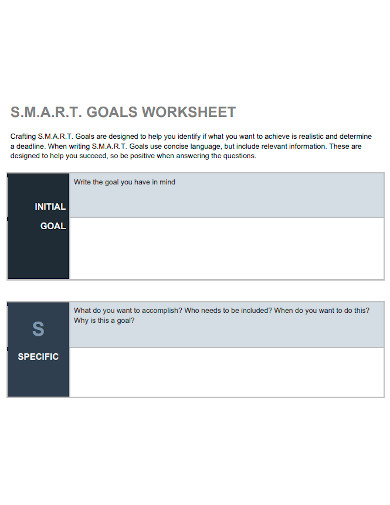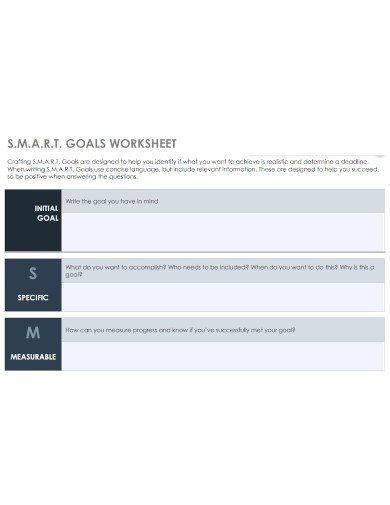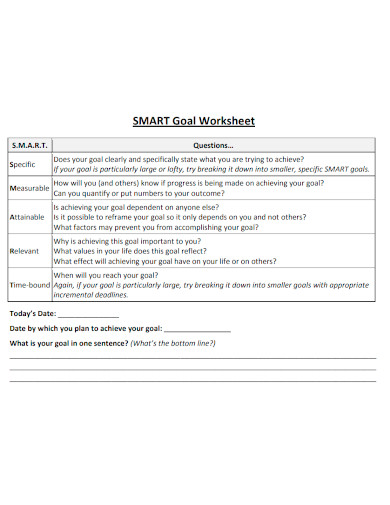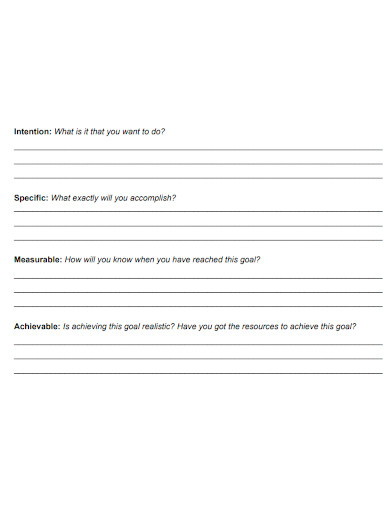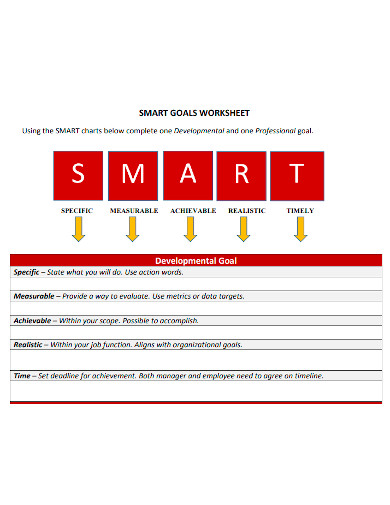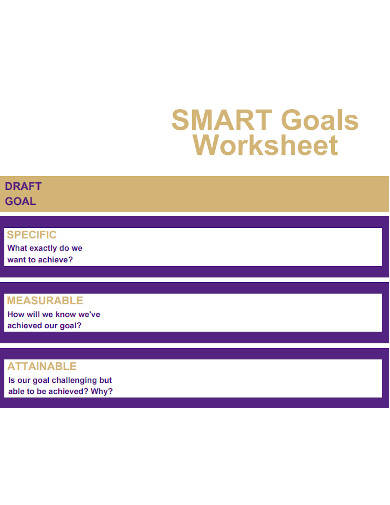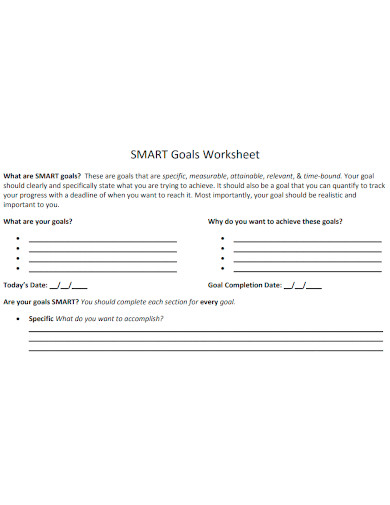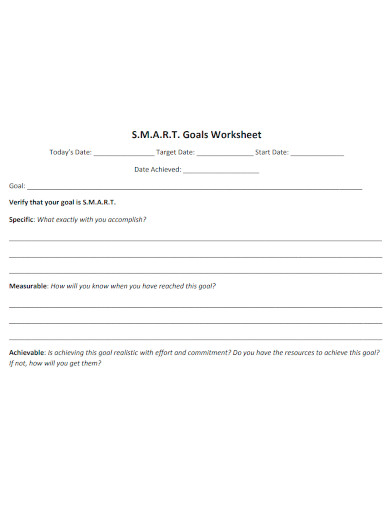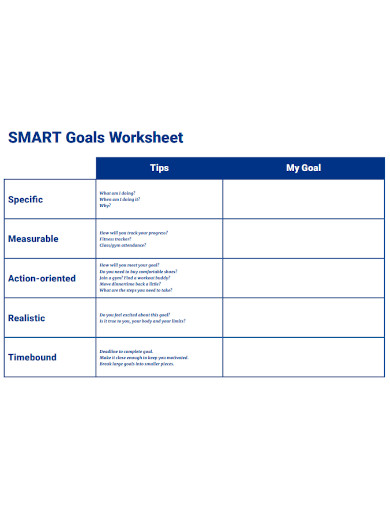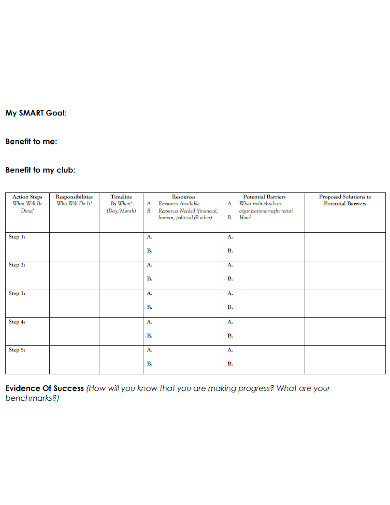We all wanted our goals to be achievable the way we envisioned it to be. That’s why we wanted our goals to be SMART (Specific, Measurable, Attainable, Result-oriented and Time-bounded). Some companies, institutions and business establishments even conduct trainings and workshops just to improve their performance and achieve their SMART goals. The very first step that you really need to make is to identify what these goals are in order for you to conduct steps and action plans on how to attain it with the best of your ability. Another way of making it very possible is through the use of worksheets.
This will not just let you identify your goals but also help you assess yourself with the actions that you are going to take as you go along the activities given. With this, our site is giving you dree, available and customizable worksheet samples and templates that you can work on to achieve your SMART goals. Just choose among these templates and customize the one that suits your needs the most.
For other worksheet needs, our site offers you Artist Statement Worksheet, Brand Positioning Worksheet, SWOT Analysis Worksheet, Printable Budget Worksheet, Research Worksheet, Small Business Worksheet, Performance Worksheet, Payroll Worksheet, Income and Expense Worksheet, Accounting Worksheet etc. and more in the storage for you. Our article does not only give you templates that you can use but also relevant and necessary information that you might want to consider knowing in making your project. So come, read the article with me now!
10+ Smart Goals Worksheet Samples
1. Smart Goals Worksheet Sample
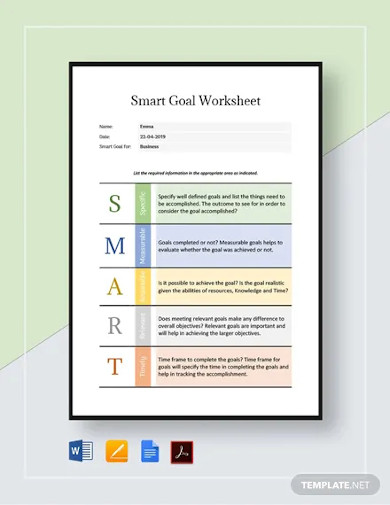
2. Printable Smart Goals Worksheet
3. General Smart Goals Worksheet
4. Basic Smart Goals Worksheet
5. Smart Goals Setting Worksheet
6. Professional Smart Goals Worksheet
7. Editable Smart Goals Worksheet
8. Formal Smart Goals Worksheet
9. Standard Smart Goals Worksheet
10. Smart Goals Worksheet Format
11. Simple Smart Goals Worksheet
What Is SMART Goal?
Do you ever feel like you’re working hard but not getting anywhere? Maybe you see little improvement in your skills or achievements when you reflect on the last five or 10 years. Or perhaps you struggle to see how you’ll fulfil your ambitions during the next few years. Many people spend their lives drifting from one job to another, or rushing around trying to get more done while actually accomplishing very little. Setting SMART goals means you can clarify your ideas, focus your efforts, use your time and resources productively, and increase your chances of achieving what you want in life. In this article, we will be tackling about the components and concepts that consists the SMART goal and assessing questions that you could use in evaluating yourself whether you are making your goals SMART or not.
What Does SMART mean?
To make sure your goals are clear and reachable, each one should be:
- Specific (simple, sensible, significant).
- Measurable (meaningful, motivating).
- Achievable (agreed, attainable).
- Relevant (reasonable, realistic and resourced, results-based).
- Time bound (time-based, time limited, time/cost limited, timely, time-sensitive).
Specific
- What do I want to accomplish?
- Why is this goal important?
- Who is involved?
- Where is it located?
- Which resources or limits are involved?
Example: Imagine that you are currently a marketing executive, and you’d like to become head of marketing. A specific goal could be, “I want to gain the skills and experience necessary to become head of marketing within my organization, so that I can build my career and lead a successful team.”
Measurable
It’s important to have measurable goals, so that you can track your progress and stay motivated. Assessing progress helps you to stay focused, meet your deadlines, and feel the excitement of getting closer to achieving your goal.
A measurable goal should address questions such as:
- How much?
- How many?
- How will I know when it is accomplished?
Example: You might measure your goal of acquiring the skills to become head of marketing by determining that you will have completed the necessary training courses and gained the relevant experience within five years’ time.
Achievable
Your goal also needs to be realistic and attainable to be successful. In other words, it should stretch your abilities but still remain possible. When you set an achievable goal, you may be able to identify previously overlooked opportunities or resources that can bring you closer to it.
An achievable goal will usually answer questions such as:
- How can I accomplish this goal?
- How realistic is the goal, based on other constraints, such as financial factors?
Example: You might need to ask yourself whether developing the skills required to become head of marketing is realistic, based on your existing experience and qualifications. For example, do you have the time to complete the required training effectively? Are the necessary resources available to you? Can you afford to do it?
Relevant
This step is about ensuring that your goal matters to you, and that it also aligns with other relevant goals. We all need support and assistance in achieving our goals, but it’s important to retain control over them. So, make sure that your plans drive everyone forward, but that you’re still responsible for achieving your own goal.
A relevant goal can answer “yes” to these questions:
- Does this seem worthwhile?
- Is this the right time?
- Does this match our other efforts/needs?
- Am I the right person to reach this goal?
- Is it applicable in the current socio-economic environment?
Example: You might want to gain the skills to become head of marketing within your organization, but is it the right time to undertake the required training, or work toward additional qualifications? Are you sure that you’re the right person for the head of marketing role? Have you considered your spouse’s goals? For example, if you want to start a family, would completing training in your free time make this more difficult?
Time-bounded
Every goal needs a target date, so that you have a deadline to focus on and something to work toward. This part of the SMART goal criteria helps to prevent everyday tasks from taking priority over your longer-term goals.
A time-bound goal will usually answer these questions:
- When?
- What can I do six months from now?
- What can I do six weeks from now?
- What can I do today?
Example: Gaining the skills to become head of marketing may require additional training or experience , as we mentioned earlier. How long will it take you to acquire these skills? Do you need further training, so that you’re eligible for certain exams or qualifications? It’s important to give yourself a realistic time frame for accomplishing the smaller goals that are necessary to achieving your final objective.
FAQs
What are the five smart goals?
The SMART acronym outlines a strategy for reaching any objective. SMART goals are Specific, Measurable, Achievable, Realistic and anchored within a Time Frame.
How do I write a goal plan?
Make it Actionable.
Use a verb when writing your goal.
Assign an Accountable Owner.
Establish Timing.
Clearly Define Success.
Connect to Why.
Break it Down into Milestone Actions.
What is a sample SMART Fitness goals?
For example, a S.M.A.R.T. goal is “I will walk enough to burn at least 1,250 calories through exercise this week.”
You might be having a hard time planning out and considering having your goals be SMART, but it is much recommendable in order for you to progress each passing day. With this, we highly encourage you to avail free and ready-made materials and resources that you can see online. So come, avail our templates now!
Related Posts
FREE 15+ Sample Social Media Marketing Plan Templates
FREE 11+ Action Plan Templates
FREE 10+ Implementation Action Plans
FREE 10+ Mentoring Action Plan Samples
FREE 10+ Performance Worksheet Samples
FREE 9+ GROW Coaching Model Samples
FREE 8+ Project Charter Templates
FREE 6+ Sample Lesson Plan Objective Templates
FREE 5+ Social Media Strategy Samples
FREE 38+ Action Plan Templates
FREE 13+ Sample Nonprofit Business Plans
FREE 10+ Simple Operational Planning Samples
FREE 10+ Media Schedule Samples
FREE 9+ Operational Plan for Cleaning Services
FREE 6+ Business Roadmap Samples

